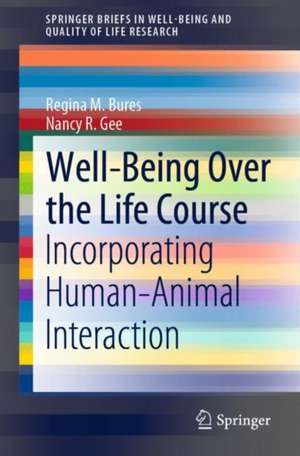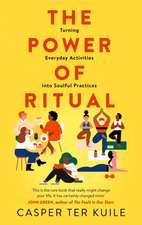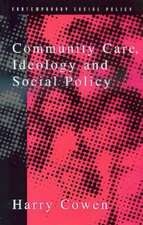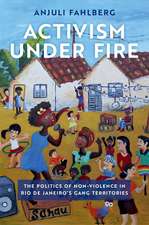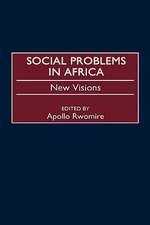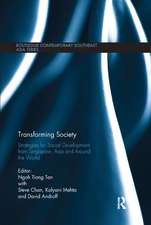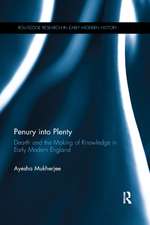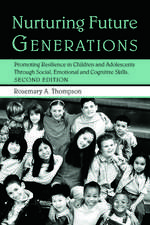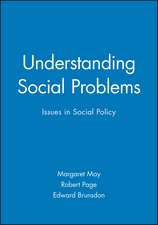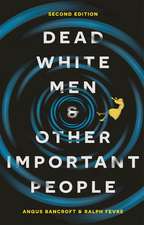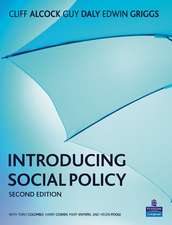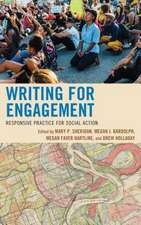Well-Being Over the Life Course: Incorporating Human–Animal Interaction: SpringerBriefs in Well-Being and Quality of Life Research
Autor Regina M. Bures, Nancy R. Geeen Limba Engleză Paperback – 15 dec 2020
Din seria SpringerBriefs in Well-Being and Quality of Life Research
-
 Preț: 277.91 lei
Preț: 277.91 lei - 5%
 Preț: 324.88 lei
Preț: 324.88 lei - 5%
 Preț: 422.13 lei
Preț: 422.13 lei -
 Preț: 410.01 lei
Preț: 410.01 lei - 5%
 Preț: 326.32 lei
Preț: 326.32 lei -
 Preț: 379.09 lei
Preț: 379.09 lei - 5%
 Preț: 358.48 lei
Preț: 358.48 lei - 5%
 Preț: 322.85 lei
Preț: 322.85 lei -
 Preț: 376.80 lei
Preț: 376.80 lei - 5%
 Preț: 357.23 lei
Preț: 357.23 lei -
 Preț: 410.94 lei
Preț: 410.94 lei - 5%
 Preț: 356.32 lei
Preț: 356.32 lei - 5%
 Preț: 356.67 lei
Preț: 356.67 lei - 5%
 Preț: 357.61 lei
Preț: 357.61 lei -
 Preț: 377.73 lei
Preț: 377.73 lei -
 Preț: 375.07 lei
Preț: 375.07 lei - 5%
 Preț: 329.66 lei
Preț: 329.66 lei - 5%
 Preț: 356.46 lei
Preț: 356.46 lei -
 Preț: 378.34 lei
Preț: 378.34 lei - 5%
 Preț: 358.48 lei
Preț: 358.48 lei - 5%
 Preț: 358.32 lei
Preț: 358.32 lei -
 Preț: 376.80 lei
Preț: 376.80 lei - 5%
 Preț: 421.92 lei
Preț: 421.92 lei -
 Preț: 379.30 lei
Preț: 379.30 lei -
 Preț: 378.71 lei
Preț: 378.71 lei -
 Preț: 375.45 lei
Preț: 375.45 lei - 5%
 Preț: 358.84 lei
Preț: 358.84 lei -
 Preț: 385.44 lei
Preț: 385.44 lei -
 Preț: 376.04 lei
Preț: 376.04 lei - 5%
 Preț: 364.85 lei
Preț: 364.85 lei -
 Preț: 355.07 lei
Preț: 355.07 lei -
 Preț: 357.86 lei
Preț: 357.86 lei -
 Preț: 411.54 lei
Preț: 411.54 lei - 5%
 Preț: 329.95 lei
Preț: 329.95 lei -
 Preț: 377.95 lei
Preț: 377.95 lei -
 Preț: 478.53 lei
Preț: 478.53 lei - 5%
 Preț: 357.77 lei
Preț: 357.77 lei - 5%
 Preț: 356.67 lei
Preț: 356.67 lei -
 Preț: 410.55 lei
Preț: 410.55 lei - 5%
 Preț: 362.16 lei
Preț: 362.16 lei - 5%
 Preț: 357.23 lei
Preț: 357.23 lei - 5%
 Preț: 357.97 lei
Preț: 357.97 lei - 5%
 Preț: 359.42 lei
Preț: 359.42 lei - 5%
 Preț: 358.84 lei
Preț: 358.84 lei -
 Preț: 442.02 lei
Preț: 442.02 lei -
 Preț: 378.54 lei
Preț: 378.54 lei
Preț: 252.59 lei
Preț vechi: 265.88 lei
-5% Nou
Puncte Express: 379
Preț estimativ în valută:
48.35€ • 52.53$ • 40.64£
48.35€ • 52.53$ • 40.64£
Carte în stoc
Livrare din stoc 12 martie
Preluare comenzi: 021 569.72.76
Specificații
ISBN-13: 9783030640842
ISBN-10: 3030640841
Pagini: 109
Ilustrații: XV, 109 p. 1 illus.
Dimensiuni: 155 x 235 mm
Greutate: 0.19 kg
Ediția:1st ed. 2021
Editura: Springer International Publishing
Colecția Springer
Seria SpringerBriefs in Well-Being and Quality of Life Research
Locul publicării:Cham, Switzerland
ISBN-10: 3030640841
Pagini: 109
Ilustrații: XV, 109 p. 1 illus.
Dimensiuni: 155 x 235 mm
Greutate: 0.19 kg
Ediția:1st ed. 2021
Editura: Springer International Publishing
Colecția Springer
Seria SpringerBriefs in Well-Being and Quality of Life Research
Locul publicării:Cham, Switzerland
Cuprins
1. Introduction.- 2. Family Life Cycle and the Role of Pets.- 3. Aging Pets and Well-Being.-4. Health over the Life Course and HAI.- 5. Child Health and Development.- 6. Successful Aging and HAI.- 7. Animal-Assisted Interventions and Well-Being over the Life Course.- 8. Conclusion.
Notă biografică
Regina M. Bures, Ph.D., is Senior Program Director at the Eunice Kennedy Shriver National Institute of Child Health and Human Development (NICHD) of the National Institutes of Health. At NICHD, Dr. Bures manages a diverse scientific portfolio in demography and population health. She has been an active contributor to the NICHD-Waltham partnership.
Dr. Bures received her Ph.D. in Sociology, with a specialization in Demography, from Brown University, and completed a postdoctoral fellowship at the University of Chicago. Dr. Bures has received numerous grants and awards, including research funding from the National Science Foundation and the National Institute of Aging. Her research interests include human–animal interaction, child and family health across the life course, and research methods. She currently lives on a small farm with her husband, dogs, cats, and sheep.
Nancy R. Gee, Ph.D., is Professor of Psychiatry, Bill Balaban Chair of Human–Animal Interaction, and Director of the Center for Human-Animal Interaction in the School of Medicine at Virginia Commonwealth University. Previously, Dr. Gee served as the Human–Animal Interaction Research Manager, for the Waltham Petcare Science Institute in Leicestershire England. She has published extensively on HAI, including her most recent book, How Animals Help Students Learn: Research and Practice for Educators and Mental-Health Professionals.
Dr. Gee continues to pursue research in HAI across the lifespan, seeking to identify the ways in which interactions with companion animals affect human cognition, mental, and physical health. Concern for the animal’s welfare and quality of life is a primary consideration for Dr. Gee, both in the Dogs on Call hospital visitation program she administers and in her various research and writing projects. Dr. Gee is a recipient of multiple grants and awards, a member of several organizational boards and journal editorial advisory boards, a reviewer of HAI research grant proposals, and a frequent presenter at national and international HAI conferences.
Dr. Bures received her Ph.D. in Sociology, with a specialization in Demography, from Brown University, and completed a postdoctoral fellowship at the University of Chicago. Dr. Bures has received numerous grants and awards, including research funding from the National Science Foundation and the National Institute of Aging. Her research interests include human–animal interaction, child and family health across the life course, and research methods. She currently lives on a small farm with her husband, dogs, cats, and sheep.
Nancy R. Gee, Ph.D., is Professor of Psychiatry, Bill Balaban Chair of Human–Animal Interaction, and Director of the Center for Human-Animal Interaction in the School of Medicine at Virginia Commonwealth University. Previously, Dr. Gee served as the Human–Animal Interaction Research Manager, for the Waltham Petcare Science Institute in Leicestershire England. She has published extensively on HAI, including her most recent book, How Animals Help Students Learn: Research and Practice for Educators and Mental-Health Professionals.
Dr. Gee continues to pursue research in HAI across the lifespan, seeking to identify the ways in which interactions with companion animals affect human cognition, mental, and physical health. Concern for the animal’s welfare and quality of life is a primary consideration for Dr. Gee, both in the Dogs on Call hospital visitation program she administers and in her various research and writing projects. Dr. Gee is a recipient of multiple grants and awards, a member of several organizational boards and journal editorial advisory boards, a reviewer of HAI research grant proposals, and a frequent presenter at national and international HAI conferences.
Textul de pe ultima copertă
This book provides a multidisciplinary overview of the impact of human–animal interaction on well-being from childhood to later life. It presents a life course perspective to the study of human–animal interaction, addressing concepts of family and the role of pets therein, as well as the impact of companion animals on child development and successful aging. This book fills a gap in the existing literature by framing the study of human–animal interaction, including the role of animal-assisted interventions on well-being, in a broader social and behavioral context.
Caracteristici
Describes how animals contribute to human health and well-being from infancy to old age Takes a broad, multidisciplinary approach to understanding the unique relationship between humans and companion animals Summarizes state-of-the-art research on the human–companion animal connection in a way that is accessible to pet owners and university students from undergraduate to graduate levels Draws upon findings from psychology, sociology, nursing, anthrozoology, veterinary science, and many other fields
